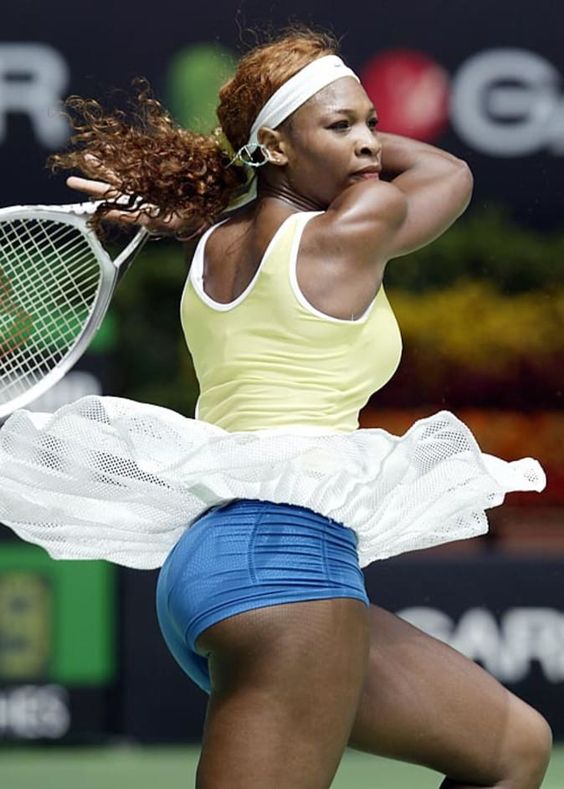In the pantheon of sports legends, few athletes have left as indelible a mark as Serena Williams. With a career spanning over two decades, Serena has not only dominated the tennis world but has also become a powerful symbol of female empowerment. Her journey has transcended the boundaries of sports, challenging and redefining societal norms around gender roles, particularly the perceived conflict between motherhood and professional achievement. Through her life and career, Serena Williams has proven that women can be both devoted mothers and elite athletes, shattering the outdated belief that women must choose between family and career. This article explores Serena’s remarkable journey, highlighting how she has redefined what it means to be a woman in both the sports world and society at large.
**Serena’s Early Years: The Making of a Champion**
Serena Williams’ story begins in Compton, California, where she and her sister Venus were introduced to tennis by their father, Richard Williams. From a young age, it was clear that Serena possessed extraordinary talent and an unyielding determination. Her rise through the ranks of junior tennis was swift, and by the time she turned professional in 1995, she was already a force to be reckoned with. Her powerful serve, athleticism, and mental toughness set her apart from her peers, and she quickly began to rack up titles.

Serena’s early successes, including her first Grand Slam victory at the 1999 US Open, were a harbinger of the dominance she would go on to establish in the sport. However, even as she ascended to the pinnacle of tennis, Serena was acutely aware of the broader implications of her success. She knew that as a black woman in a predominantly white sport, her victories carried added significance. She was not just playing for herself but for all the young girls who looked up to her as a role model.
**The Intersection of Motherhood and Professional Sports**
For many years, the narrative around female athletes has been that their careers must take a backseat to motherhood. The expectation that women should prioritize family over their professional aspirations has been deeply ingrained in society, often forcing female athletes to retire early or face criticism for continuing their careers after becoming mothers. Serena Williams has been instrumental in challenging and dismantling this narrative.
When Serena announced her pregnancy in 2017, the world wondered if this would mark the end of her illustrious tennis career. The pressure on female athletes to choose between motherhood and their profession is immense, and many believed that Serena would follow the traditional path of retiring to focus on her family. However, true to her nature, Serena defied expectations.
**The Challenges of Returning to the Court**
Serena’s return to tennis after giving birth to her daughter, Alexis Olympia Ohanian Jr., was nothing short of heroic. Her pregnancy and subsequent childbirth were far from easy; she experienced life-threatening complications, including a pulmonary embolism that required multiple surgeries. Despite these challenges, Serena was determined to return to the sport she loved.

In 2018, just eight months after giving birth, Serena made her comeback at the French Open. Her return was not merely about reclaiming her spot at the top of the tennis world; it was a statement to women everywhere that motherhood does not signify the end of one’s professional dreams. Serena’s journey back to peak physical condition was arduous, and her struggles were compounded by the scrutiny and pressure she faced as a high-profile athlete. Yet, she persevered, reaching the finals of Wimbledon and the US Open that same year, proving that her competitive spirit was as strong as ever.
**Redefining Gender Roles in Sports and Society**
Serena Williams’ decision to continue her career after becoming a mother has had profound implications for the perception of gender roles in sports and beyond. Traditionally, women have been expected to sacrifice their careers for the sake of their families, a standard that has rarely been applied to men. By choosing to return to professional tennis, Serena challenged this double standard and demonstrated that women should not have to choose between their careers and their roles as mothers.
Her journey has sparked important conversations about the need for better support systems for working mothers, particularly in the world of sports. Issues such as maternity leave, childcare, and the physical demands of pregnancy and childbirth are now being discussed more openly, largely due to Serena’s influence. Her advocacy for these issues has brought them to the forefront of public discourse, encouraging other female athletes to speak out and demand the support they need to balance their careers and motherhood.
**Serena’s Advocacy for Women’s Rights and Equality**
Beyond her own experiences, Serena Williams has been a tireless advocate for women’s rights and gender equality. She has used her platform to address the systemic inequalities that women face, both in sports and in society at large. One of the most significant issues she has highlighted is the gender pay gap, which persists in many professional sports, including tennis. Despite being one of the most successful athletes in history, Serena has had to fight for equal pay and recognition, a battle that continues to this day.
 Serena has also been vocal about the lack of representation of women, particularly women of color, in leadership roles within the sports industry. She has called for greater diversity and inclusion, arguing that the voices and experiences of women must be represented at all levels of decision-making. Her advocacy has inspired other athletes to join the fight for equality, creating a ripple effect that is slowly but surely transforming the sports industry.
Serena has also been vocal about the lack of representation of women, particularly women of color, in leadership roles within the sports industry. She has called for greater diversity and inclusion, arguing that the voices and experiences of women must be represented at all levels of decision-making. Her advocacy has inspired other athletes to join the fight for equality, creating a ripple effect that is slowly but surely transforming the sports industry.
**The Legacy of Serena Williams: Inspiring Future Generations**
Serena Williams’ impact extends far beyond her individual achievements. She has become a symbol of resilience, strength, and determination for women around the world. Her ability to balance the demands of motherhood with the rigors of professional sports has set a new standard for what women can achieve. Young girls, in particular, look up to Serena as a role model, not just for her success on the tennis court but for her courage in challenging societal norms.
Through her example, Serena has shown that women do not have to limit themselves or conform to traditional gender roles. She has proven that it is possible to excel in multiple aspects of life, whether that means being a world-class athlete, a devoted mother, or an advocate for social justice. Her legacy will undoubtedly continue to inspire future generations of women to pursue their dreams with confidence and determination.
**The Future of Gender Roles in Sports**
The barriers that Serena Williams has broken down will have lasting implications for the future of gender roles in sports. Her journey has sparked important conversations about the need for more support for female athletes, particularly those who are also mothers. As more women follow in Serena’s footsteps, we are likely to see a shift in how gender roles are perceived in the athletic world.
The sports industry is slowly beginning to recognize the importance of providing adequate support for female athletes, including maternity leave, childcare, and access to resources that can help them balance their careers and family life. Serena’s advocacy has played a crucial role in driving these changes, and her influence will continue to shape the future of sports for women.

**Conclusion**
Serena Williams has proven that women can indeed be both great mothers and top athletes, breaking down all social barriers about gender roles. Her journey has been one of extraordinary triumphs, both on and off the tennis court. By challenging the traditional expectations placed on women, Serena has redefined what it means to be a female athlete in the modern era. Her legacy is not just one of sports greatness but also of empowerment, inspiring women everywhere to pursue their passions without fear of societal judgment. As Serena continues to excel, her influence will undoubtedly endure, serving as a powerful reminder that gender roles are not limitations but constructs that can be redefined and reshaped by those who dare to challenge them.





